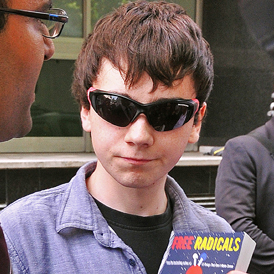Anonymous: help us pay hacker suspect’s fees
Members of the digital collective Anonymous are collecting donations for the legal fees of Jake Davis, the 18-year-old who has appeared in court facing five charges related to hacking.

High-ranking members of the group are using social networking sites such as Facebook and Twitter to ask hackers to contribute funds to Davis, who is accused of being the real-life person behind “Topiary”, an alleged leader of LulzSec, the Anonymous breakaway cell.
LulzSec has claimed responsibility for cyber attacks on, among others, the websites of the Serious Organised Crime Agengency (Soca) and Sony.
Davis was arrested on 27 July in the Shetland Islands as part of an investigation into the global hacking groups LulzSec and Anonymous.
He is accused of conspiring to carry out distributed denial of service (DDoS) attacks, which flood websites with traffic to make them crash.
Anonymous hackers are asking potential donors to contribute bitcoins – digital currency that can be exchanged for hard currency – to help pay Davis’s legal expenses, as part of what it is calling Operation: Free Topiary.
Once the bitcoins are converted into online funds, they can then be transferred in a number of ways, but several Anonymous hackers told Channel 4 News via an IRC (Internat Relay Chatroom) that they intended to send the money to Davis’s mobile phone number via text message (SMS).
They added that the group has already received a “significant” amount of money.
The operation has been a popular subject for many hackers using IRCs frequented by members of Anonymous, and discussions have taken place about staging real-life protests against charges faced by Davis.
Several supporters of the teenager say they plan to stage a protest on 30 August – the date of Davis’s Crown court appearance – outside Glasgow Central Station, although it unclear why that location has been chosen.
Others plan to demonstrate outside Southwark Crown Court.
The drive to secure donations was started by a hacker who uses the moniker Sabu, and who is widely believed to be the leader of LulzSec as well as a significant member in Anonymous.
‘Arrested hackers are political prisoners’
Sabu, who has denied claims of being affiliated with terrorist organisations, has said that Anonymous hackers who are arrested should be treated as political prisoners.
The hacker wrote on Twitter: “To make it clear: Any member of Anonymous who gets arrested must be treated as a Political Prisoner… Political Asylum should be considered.”
Any member of Anonymous who gets arrested must be treated as a Political Prisoner. Political asylum should be considered – Sabu, on Twitter
Sabu added later: “IF someone is arrested for doing something politically motivating … they are not a political prisoner?”
Sun attack
Soca’s website was shut down by a cyber attack in June, and Davis also allegedly hacked into a website providing sexual health information for people under 24.
On Monday, Rav Chodha, prosecuting, said: “The organisations that were hacked were Sony, Soca, East London NHS Foundation Trust and News International.”
Describing an attack on News International’s Sun website, he said: “He wrote the article about Rupert Murdoch being dead and that was posted into the Sun website.”
Some readers of the Sun have been sent an email warning them computer hackers may have stolen their personal details, including their addresses, dates of birth and phone numbers.
The five charges are gaining unauthorised access to a computer system, encouraging or assisting offences, two counts of conspiring to commit offences and conspiring to carry out a distributed denial of services attack.
District judge Howard Riddle bailed him under strict conditions, which include not accessing the internet or having any device capable of accessing the web.
Davis’s arrest came a month after 19-year-old Ryan Cleary from Essex, another suspected member of LulzSec, was charged with a total of five offences under the Criminal Law and Computer Misuse Acts.